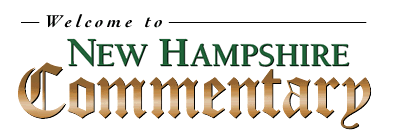

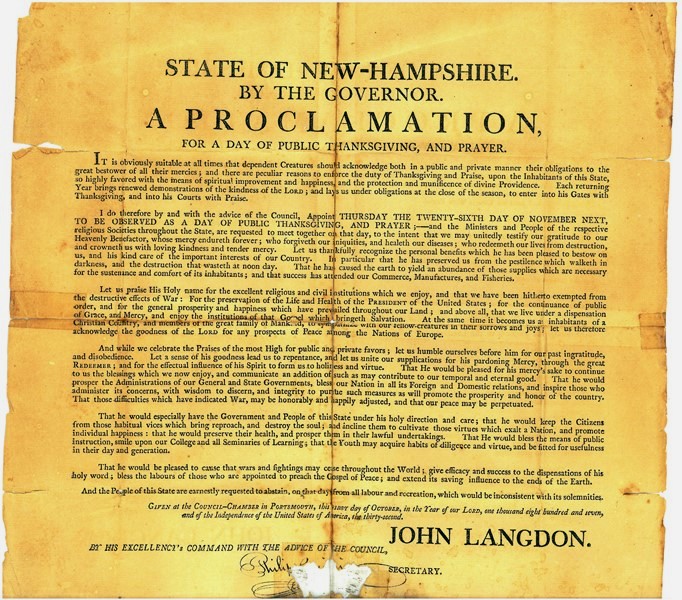
Day of Public Thanksgiving and Prayer, NH Governor John Langdon Proclamation, October 1, 1807, Philip Carrigan, secretary of state. NH State Archives collection.
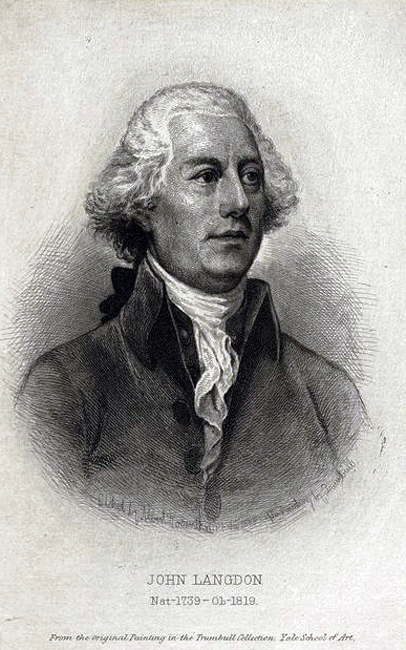
Governor and First President Pro Tempore of the United States Senate, John Langdon of New Hampshire
______________________________________________
The Mayflower, and a Little Pilgrim and New Hampshire History
How the Pilgrims 'Got America Started' -- George F. Will
Tribute to U. S. Ambassador Robert C. Hill, late member, New Hampshire Mayflower Society -- Dean Dexter
How the Pilgrims cooked Turkey, Chicken, Venison (with thanks to Caleb Johnson)
Plymouth Rocked -- The New Yorker
Brief History of the Society of Mayflower Descendants in the State of New Hampshire -- Dean Dexter
______________________________________________________
New Hampshire and the Observance of Thanksgiving
By DEAN DEXTER, governor, NH Society of Mayflower Descendants, 2008-2012
The first Thanksgiving was celebrated in 1621 when Governor William Bradford proclaimed a three-day feast after a successful harvest, following the devastating winter where over half their members died. But do you know the role New Hampshire has played in this most American of holidays?
As early as 1781, the Continental Congress in Philadelphia proclaimed November 28 “as a day of solemn thanksgiving to God for all his mercies,” and sent copies of the document to each colony (see below). New Hampshire’s first Governor, Meshech Weare (the official title then was “President”), ordered the proclamation “forthwith printed,” and delivered far and wide “to the several worshipping assemblies in this state, to whom it is recommended religiously to observe said day, and to abstain from all servile labor thereon.” So much for the mythology of a “separation of church and state” mindset among the nation’s founders.
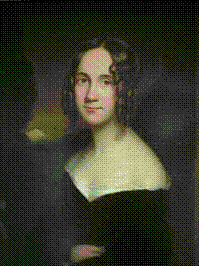
New Hampshire's Sara Josepha Hale
In fact, days of “thanksgiving, fasting, and prayer” were common in the founding era, and a holiday commemorating the Pilgrim’s sacrifices after harvest was popular throughout the 13 colonies, although not observed on a common date. George Washington was the first president to declare a national Thanksgiving Day under the new Constitution in 1789.
Thanksgiving remained popular throughout the country during the 1800s, but it was the 35 year crusade of a New Hampshire woman, Sara Josepha Hale of Newport (above), author of the anti-slavery best-seller, Northwood, and a powerful editor of a national magazine, that persuaded President Abraham Lincoln, who Sara had personally lobbied, to declare the last Thursday in November a national holiday in 1863.
In an effort to extend the Christmas shopping season following the Great Depression, President Franklin Roosevelt, a Mayflower descendant, changed the observance to the third Thursday in November. After much controversy, however, Congress permanently changed the date back to the fourth Thursday in 1941.
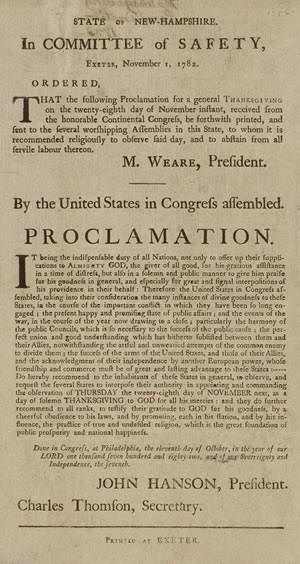
Public Notice issued by "President" Meshech Weare of New Hampshire, declaring November 28, 1782 a Day of Thanksgiving as proclaimed by Congress.
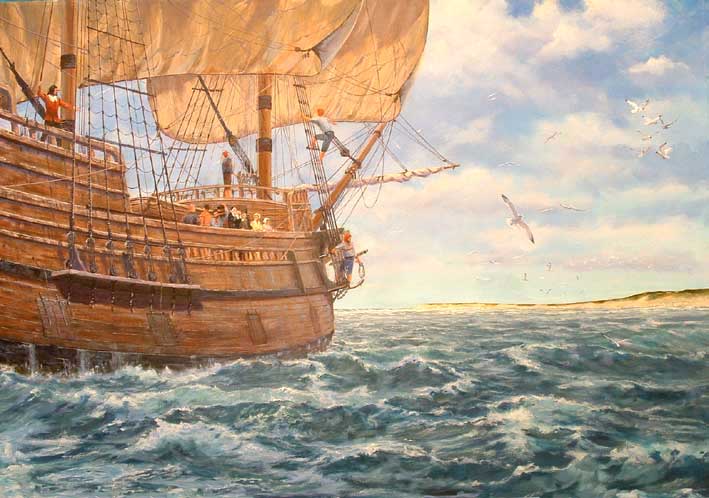
The Mayflower caught in a riptide off the coast of what is now Long Island, N.Y., November 9, 1620 is nearly shipwrecked. Original art by Mike Haywood provided by the General Society of Mayflower Descendants.
Writes Haywood: "On November 9, 1620, the Mayflower's crew sighted Cape Cod and attempted to sail south to the mouth of the Hudson River, near modern-day Long Island, New York. Although the weather was fine, they got caught in a riptide and nearly shipwrecked on the shallow sand banks to the south of the Cape at Monomy Point. Of course, the ship ended up landing at Cape Cod, where the Plymouth Colony was founded. Pilgrim William Bradford described the event as follows:
" 'After some deliberation had amongst them selves and with the master of the ship, they tacked aboute and and resolved to stande for the southward (the wind and weather being faire) to finde some place aboute Hudson's River for their habitation. But after they had sailed that course aboute halfe the day, they fell amongst deangerous shoulds and roring breakers, and they were so farrr intangled ther with as they conceived them selves in great danger; and the wind shrinking upon them withall, they resolved to bear up againe for the Cape, and thought themselves hapy to gett out of those dangers before night overtooke them, as by God's providence they did.' "
A harrowing scene of the the Mayflower at Sea, by
Mike Haywood provided by the General Society of
Mayflower Descendants.
_________________________________________________________

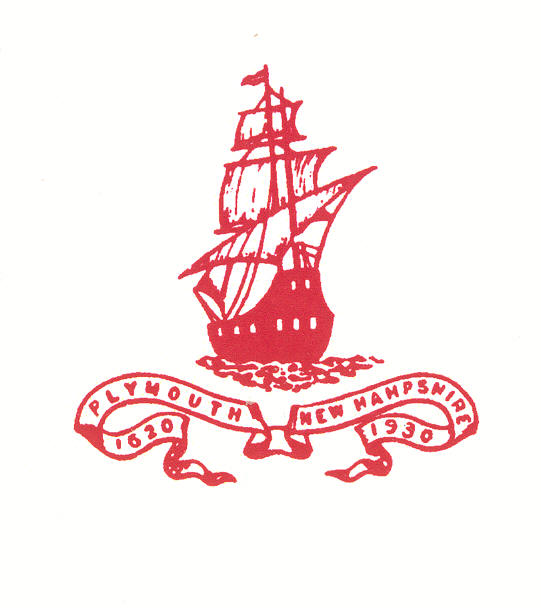
Society of Mayflower Descendants
in the State of New Hampshire
Below are selected Programs from past meetings of the New Hampshire Mayflower
Dr. John Robinson of Meredith Addresses NH Mayflower Society, Nov. 3, 2007
New Hampshire Historical Society President John Robinson was the guest speaker at the Fall 2007 Compact Day luncheon, held at the Concord Holiday Inn on November 3. Robinson used the example of his own ancestor, a Revolutionary soldier also named John Robinson, to convey a picture of life in central New Hampshire, and of the social and cultural forces at work in the region preceding, during, and after the War for Independence. Robinson, a retired Dean of Graduate Studies at Boston’s Simmons College, now lives at the family homestead in Meredith, founded by his Revolutionary forebear, which has been in the family, uninterrupted since the 1790s.
Robinson suggested life in New Hampshire at the time of the Revolution had taken on a kind of “garrison mentality,” due to the many conflicts with Indians people were exposed to as they settled in the wilderness, including the larger struggles of the era, such as the bloody King Philip’s War, following the death of Massasoit, and the various Colonial Wars: King William's, Queen Anne's, and King George's, and the French and Indian War. While the Indians were one menace, certainly the British were another. Antagonism with British rule under New Hampshire’s Royal Governors also encouraged the sense of a martial self-sufficiency among the citizenry.
Thus, well accustomed to ongoing warfare of one kind or another for nearly 200 years, Robinson’s ancestor was likely not aware – along with everyone else – of the high significance of the cause he was joining when he enlisted as a drummer boy in Washington’s army under General John Sullivan at Exeter in June of 1775, which was, of course a full year before the Declaration of Independence. Then, no one really knew what was at stake except that the British army was occupying Boston, and this was ominous. The ancestral Robinson was sixteen, and to him, this was probably just another call to meet a common threat, something young men of his age had been doing for generations.
But of course, this was not just another conflict. In the end, the boy grew to manhood under arms, and was taken prisoner by the British twice during his more than six years of service, which included that famous winter at Valley Forge with Washington. Young Robinson also fought in the battles of Quebec, Hubbardton (Vermont), Monmouth (New Jersey), and Yorktown (Virginia). He was captured both at Quebec and Hubbardton, and in one case escaped, and in another, paroled.
After the war, young Robinson, a descendant of Mayflower passenger, Degory Priest, returned to Meredith to resume the difficult life of a farmer on the edge of what was still wilderness. He died in March of 1848, just shy of his 89th birthday, a military pensioner, a fact proudly noted on his headstone in a small graveyard on the Meredith homestead.
Robinson sees irony in the post-Revolutionary life for his ancestor, and his neighbors. Since his life differed little from that of his Colonial forebears, this “Revolution” for which he fought so long in the end had little practical effect on Robinson’s personal life or fortune. As was the case for his Pilgrim ancestor, it would be left to future generations to assess and fully appreciate the role this soldier of the Revolution, and others like him, played in what turned out to be a truly great moment of history. — Dean Dexter.
Dr. Robinson, whose father, Dr. Hugh Robinson, long-time medical missionary to China, was a member of the Massachusetts Society, received his undergraduate degree in American Civilization from Brown University, and his Ph.D. in Education from Harvard. His wife Olga joined him as a guest of the Society at the luncheon. They celebrated their 50th wedding anniversary in June, 2007. Dr. Robinson, himself, became a member of the New Hampshire Society in October of 2011 through his descent from Degory Priest.
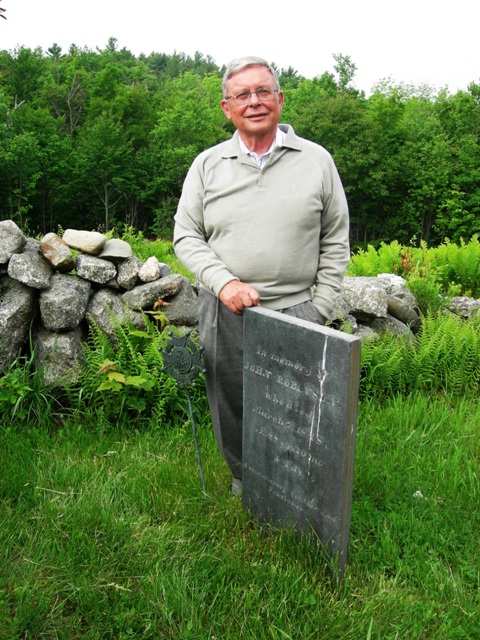
Dr. John Robinson, retired Dean of Graduate Studies, Simmons College, Boston, and Past President of the NH Historical Society, at the grave of his ancestor, Revolutionary War soldier John Robinson, a descendant of Mayflower passenger Degory Priest, on the family farm, Chemung Road, Meredith, New Hampshire. Also see The Night Little Emma Jane Robinson Left this World.
New Hampshire Mayflower Society Celebrates 75th Anniversary, November 2005
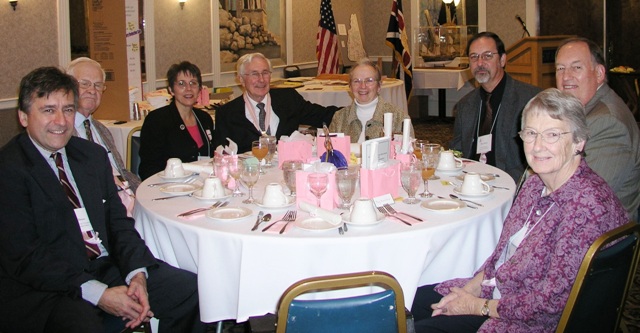
Among those attending the 75th Anniversary dinner of the Society of Mayflower Descendants in the State of New Hampshire at Concord on November 5, 2005 were: Dean Dexter, deputy governor, later governor (2008-2011), former society Governors Edward F. Holden and Joanne Tuxbury, then-outgoing Governor Carlton R. Bradford and Mrs. Bradford, former Governor, the Rev. Paul Sweet, outgoing Deputy Governor General and Governor of the Illinois Society Don West, the guest speaker, and long-time Board of Assistants member Margaret "Peg" Moreland.
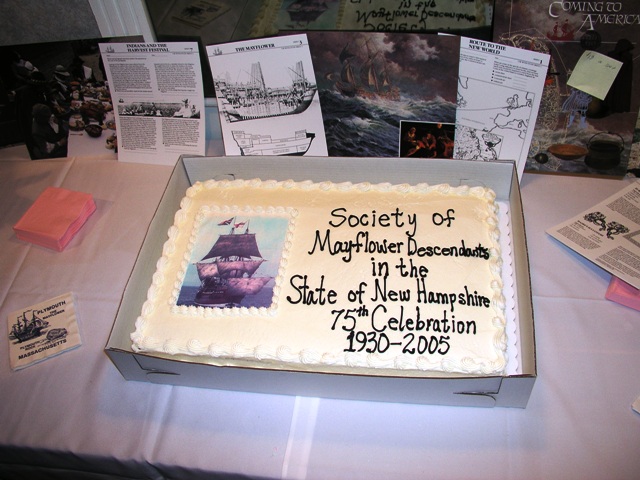
Historic 2003 Gathering: Massasoit and Governor Bradford Kin Pow-wow in Concord, New Hampshire at Mayflower Society Meeting.
Nearly 400 years after a peace treaty was signed by their ancestors, direct descendents of Pilgrim Governor William Bradford and Chief Massasoit, met in Concord to celebrate the rich place both families have in American history, as well as the special relationship native Americans had with the first white settlers in New England. Paul A. Weeden of Bristol, Rhode Island, also known as Deerfoot, was the guest speaker before the N.H. Mayflower Society on May 17th (2003), hosted by society governor Carlton Bradford of New London. The event was open to the public. See Link about the treaty here.
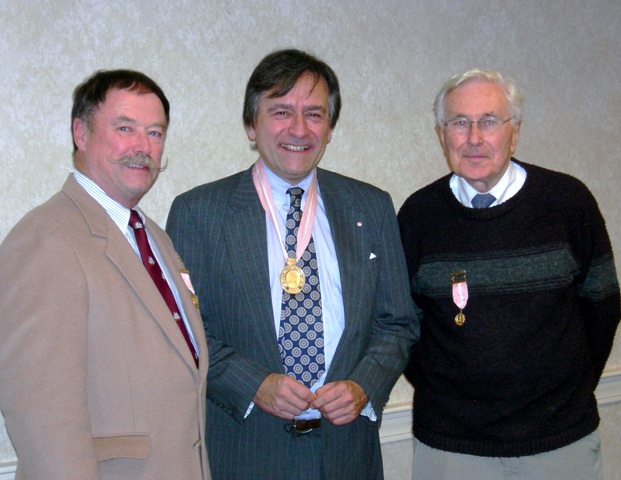
Former New Hampshire Mayflower Society governors Walworth Johnson, Jr., left, and Carlton Bradford, right, with incoming Governor Dean Dexter, at the November 8, 2008 annual meeting and election of officers, Concord, N.H. Mr. Dexter's term ended November 12, 2011.
The Mayflower Compact
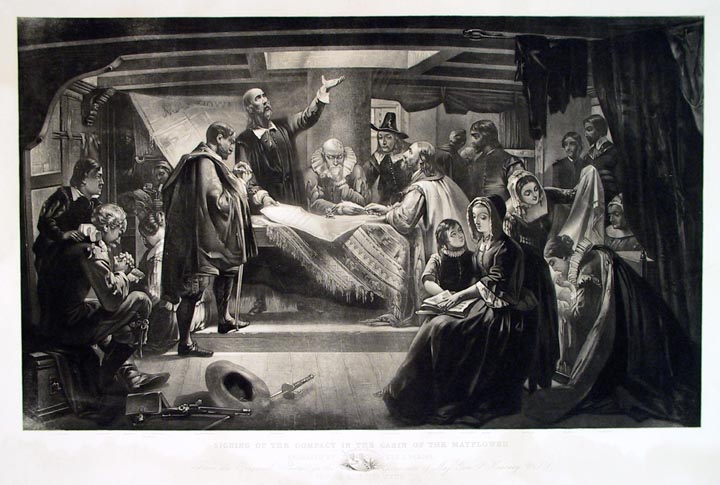
_________________________________________________
"The Signing of the Compact in the Cabin of the Mayflower," an engraving on mezzotint by George Edward Perine (9 July 1837 – 3 February 1885), executed when Perine was age 19, from a painting by Edward White (1817 - 1877), now at Yale University. At the time the painting was in the possession of Maj. Gen. Philip Kearney, U.S.A., and is so noted in the title. A key below the image identifies fifteen major figures, including Miles Standish, Elder William Brewster (gesturing) , William Bradford, and their wives. Governor John Carver is at center. The Mayflower Compact was the first governing document and social contract signed in what would later become the United States of America, on November 11, 1620, on board the Mayflower.
In ye name of God, Amen. We whose names are underwritten, the loyall subjects of our dread soveraigne Lord King James, by ye grace of God, of Great Britaine, Franc, & Ireland king, defender of ye faith, &c.
Haveing undertaken, for ye glorie of God, and advancemente of ye Christian faith, and honour of our king & countrie, a voyage to plant ye first colonie in ye Northerne parts of Virginia, doe by these presents solemnly and mutualy in ye presence of God, and one of another, covenant & combine our selves togeather into a civill body politick, for our better ordering & preservation & furtherance of ye ends aforesaid; and by vertue hearof, to enacte, constitute, and frame shuch just and equall lawes, ordinances, acts, constitutions & offices, from time to time, as shall be thought most meete & convenient for ye generall good of ye Colonie: unto which we promise all due submission and obedience.
In witness whereof we have hereunder subscribed our names at Cap-Codd ye .11. of November, in ye year of the raigne of our soveraigne lord King James of England, France, & Ireland ye eighteenth, and of Scotland ye fiftie fourth. Ano: Dom. 1620.
_________________________________________________
Mayflower Passengers
From the family scrapbook...






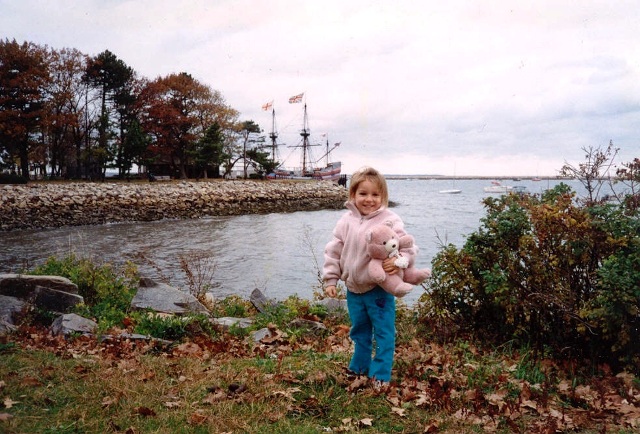
Elizabeth Helen Dexter with the Mayflower II, Plymouth, Massachusetts, at age three and a half.
_____________________________________________
New York Mayflower Society Debutante Ball is Open to all State Members
In the last issue we suggested that the New Hampshire Society consider holding a Mayflower dance in the fall, maybe on the seacoast at Wentworth-by-the-Sea or in a fine hotel in Manchester or Concord. We did not get a lot of response to this idea. Maybe it’s because a “Mayflower Thanksgiving Ball” is a big project that would involve much planning and expense. Also, many who would likely participate reside out of state and are not available to work on such an undertaking.
We’ve looked into the New York Society’s annual Debutante Ball, which is held on the first Friday in November. We did not know that this event is open to Mayflower society members from any state. Those interested in attending this exceptional affair should contact the New York society’s executive director to obtain an invitation. She is very nice. Her name is Sarah C. Morse, and she can be easily reached via email at director@mayflowernewyork.org
This year’s ball* is the society’s 53rd and will be held on November 3rd at the opulent University Club in New York City. It will feature a gourmet dinner with dancing to the legendary Lester Lanin Orchestra. Regular tickets are $400 each, junior members are $250. Patron tickets are $500. Debutante fees are $2,500. Parents of debs are asked to buy two patron tickets and debs are to have two escorts ($250 each). To be eligible to be presented, a young lady must be between 18 and 24 years old and be blood related to a Mayflower passenger. Sarah said about 200 people attend the ball, and most debutantes are in their first year in college.
We want our New Hampshire members to know that if they would like to experience an elegant tradition from another era like the New York Society’s prestigious Debutante Ball, they are invited to participate. As for me, dad said I can either be a debutante next year or get a nice used car. I’m still thinking about this...Anyone know the phone number for AutoFare?
 -Lyzz
-Lyzz
Edited from the New Hampshire Mayflower Society's newsletter The Shallop, Fall 2006 edition, Elizabeth (Lyzz) Dexter, junior page editor.
_____________________________________________
Society of Mayflowers Descendents in the State of New Hampshire
Roster of Governors
Mrs. Wendell Burt Folsom
(Elizabeth Florence Knowles)
1930-1936
General Conrad Edwin Snow
1936-1938
The Honorable Foster Stearns, United States Congressman*
1938-1940
Franklin N. Rogers, M.D.
1940-1942
Mrs. Charles Carpenter Goss
(Winifred Lane)
1942-1943
Mrs. Ralph L. Crockett
(Florence Mary Tilton)
1943-1945
The Rev. Richard Allen Day
1945-1947
Harold C. Pickwick, M.D.
1947-1949
Merton T. Goodrich
1949-1951
John S. Shepard
1951-1953
The Rev. Franklin C. Thompson
1953-1955
Chester W. Jenks
1955-1957
Mrs. Med M. Chandler
(Florence E. Tuttle)
1957-1959
Mrs. Paul R. Bartlett
(Ruth Johnson)
1959-1961
James Gilman Barnes
1961-1963
Colonel William H. Bassett, Jr.
1963-1965
Mrs. Spencer S. Furbush
(Mary L. Chapman)
1965-1967
Philip A. Wilcox
1967-1969
Mrs. Elroy L. Heath
(Marjorie A. Holden)
1969-1971
W.B. Shubrick Clymer
1971-1972
Miss Marjorie F. Pray
1972-1974
Walworth Johnson, Sr.
1974-1976
Mrs. Kurt Winters
(Catherine L. Norwood)
1976-1978
Richard J. Partington
1978-1981
Mrs. Richard J. Partington
(Harriet M. Gray)
1981-1984
Donald R. Bryant, Esq.
1984-1987
Mrs. Melvin E. Watts
(Ruth I. Gilkerson)
1987-1990
Edward Fuller Holden
1990-1993
Mrs. Raymond J. Thivierge
(Shirley E. Bates)
1993-1996
Stephen M. Sweet
1996-1999
The Reverend Paul A. Sweet
1999-2000
Mrs. Richard Tuxbury
(Joanne L. Hancock)
2000-2002
Carlton R. Bradford, Jr.
2002-2005
Walworth Johnson, Jr.
2005-2008
Dean Joseph Dexter
2008-2011
John R. Payzant
2011- 2014
Richard Herbert Tivey
2014-2017
Heather Rojo
2017-

* U.S. Congressman, 2-District of N.H. 1939-1945
_______________________________________________________
Links
![]() Society of Mayflower Descendants in the State of New Hampshire
Society of Mayflower Descendants in the State of New Hampshire
A Brief History of the N.H. Mayflower Society -- Dean Dexter
Mayflower History and Study Guide -- by Duane A. Cline
Order of the First Families of New Hampshire, 1622-1680
Cyndi's List (a lineage site)
Book Review: Plymouth Rocked -- The New Yorker
Return to N. H. Commentary Home Page
© 2003-2011 NH Commentary
P.O. Box 706
Concord, NH 03302